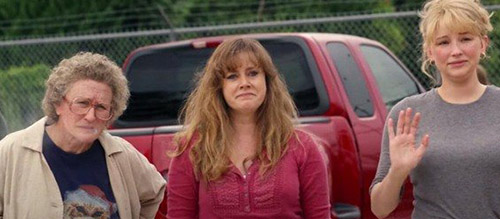Hillbilly Elegy (2020) Review
Hillbilly Elegy (2020)
Director: Ron Howard
Screenwriters: Vanessa Taylor
Starring: Gabriel Basso, Amy Adams, Glenn Close, Haley Bennett
Ron Howard’s 2020 Netflix Original drama Hillbilly Elegy was met with a wide range of criticism almost as soon as the trailer was released, with two words often standing out from the rest: Oscar Bait. On the surface, Hillbilly Elegy looked destined to join the annals of issue-fronted dramas so often nominated at the Oscars in the past few decades, the cast and crew each being Academy favourites and the narrative following a young Yale law student having to deal with his mother’s drug addiction and past trauma (all the while trying to earn a job after his graduation). This story of taboo, poverty, addiction and redemption seemed like just the kind of thing the Academy would eat up, and the trailer even promised a monologue or two to play in the “your nominees are” videos shown each year. But is Hillbilly Elegy worthy of an Oscar, or just another shallow attempt by the world’s foremost streaming service to bag yet more critical recognition?
Upon its initial release, the book upon which this movie is based received polarising reviews; it was generally well liked by the right wing press and criticised heavily by the left for generalising white working class America. Critics also noted J.D. Vance’s circular logic on the subjects he tackled. It wasn’t for everyone, and neither is this film.
In Ron Howard’s adaptation, the Midwestern United States is portrayed through just as stereotypical of a lens as it is in Vance’s novel, the titular “hillbillies” being close to Deliverance levels of offensive. Unfortunately, the tone doesn’t help – scenes that aim to illustrate how the protagonist (Gabriel Basso playing J.D. Vance himself) is out of his depth amongst the lawyers he strives to work for are so badly portrayed that you’d think this was a comedy. At one stage, during a dinner, Vance makes an impassioned cry of “why are there so many fucking forks?” in a moment more The Room than The Godfather.
This wouldn’t have been so bad if the film had committed to the original novel’s distinct (albeit divisive) politics. At least then Hillbilly Elegy would have some semblance of purpose. Though it is easy to see why screenwriter Vanessa Taylor, director Ron Howard and studio Netflix would want to tone down some of the divisive novel’s politics, doing so leaves a hollow shell of a film that is more a self-congratulatory pat on the back for the novel’s author than it is a well constructed, purposeful or moving film.
Almost all of the issues are, then, born from the reluctant screenplay that removes the meat of the story, though this isn’t all that Vanessa Taylor’s work gets wrong.
Rather than playing out as The Godfather Part II, telling the cross-generational story that it could be, the film instead erratically jumps between J.D. at age 13 (1997) and J.D. at age 27 (2011) with little to no direction. Each major influence in J.D.’s life is seemingly only capable of one character trope – his mother Bev likes drugs, his sister Lindsay has a boyfriend named Kevin, his grandmother Mamaw shows tough love – and such a one dimensional take on each character means that the story never really develops, no matter what period of J.D.’s life the film is in. In 1997 Bev is a drug addict and Lindsay is dating Kevin – in 2011 Bev is a drug addict and Lindsay is dating Kevin. Any stage of the film that attempts to provide progression for the characters comes across as ham-fisted, often shown through scenes that feel incredibly out of place with the rest of the movie and are never brought up again.
This complete lack of trajectory for the characters makes it incredibly difficult for stars Amy Adams and Glenn Close to pull off the levels of performances that they are known for (in spite of their total transformations achieved through the film’s excellent costume and makeup departments), a case which is only worsened through Howard’s decision to direct the film with almost no subtlety. Almost everything about Hillbilly Elegy feels like it’s turned up to eleven, making for multiple unintentionally hilariously moments throughout the movie and this year’s worst case of over-reaching for those Gold-plated statuettes.
While the attachments of Adams, Close and director Ron Howard do add some legitimacy to the picture – the trio sharing fifteen Oscar nominations between them, and two wins – almost every high-calibre individual that has taken part in Hillbilly Elegy turns in an underwhelming performance, whether that be in front of or behind the camera.
Perhaps the most positive takeaway Hillbilly Elegy offers is that the experience is never boring. Unpleasant maybe, but never boring. Despite narrative threads that don’t go anywhere, characters that don’t develop, ham-fisted direction and lacklustre writing, Hillbilly Elegy flies by. Perhaps whomever edited the trailer for this movie could be nominated for an Oscar? They certainly deserve great praise for ever making anyone believe that Hillbilly Elegy could ever be worthy of an awards season run in the first place.
6/24
Recommended for you: Top 10 Ron Howard Movies


